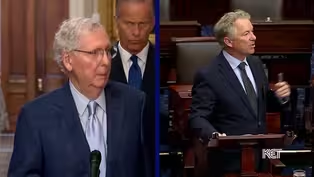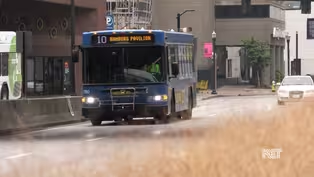
Kentucky Utilities Hurricane Helene
Clip: Season 3 Episode 89 | 6m 13sVideo has Closed Captions
Kentucky Utilities responds to rumor of manpower shortage.
Renee Shaw talks to KU Energy's Liz Pratt about a rumored claim that the power company sent workers out of state to storm-raged areas and weren't left with the sufficient manpower to deal with the electric outages in Kentucky.
Problems playing video? | Closed Captioning Feedback
Problems playing video? | Closed Captioning Feedback
Kentucky Edition is a local public television program presented by KET

Kentucky Utilities Hurricane Helene
Clip: Season 3 Episode 89 | 6m 13sVideo has Closed Captions
Renee Shaw talks to KU Energy's Liz Pratt about a rumored claim that the power company sent workers out of state to storm-raged areas and weren't left with the sufficient manpower to deal with the electric outages in Kentucky.
Problems playing video? | Closed Captioning Feedback
How to Watch Kentucky Edition
Kentucky Edition is available to stream on pbs.org and the free PBS App, available on iPhone, Apple TV, Android TV, Android smartphones, Amazon Fire TV, Amazon Fire Tablet, Roku, Samsung Smart TV, and Vizio.
Providing Support for PBS.org
Learn Moreabout PBS online sponsorshipBack here in Kentucky, power has finally been restored to hundreds of thousands of customers following Friday's landfall.
And part two of my interview with the communications director for LG Energy and CU Energy, Liz Pratt, responds to some frequently asked questions from customers in the dark during weather related power outages.
One of the rumored claims is that the power company sent workers out of state to storm ravaged areas and were left with the insufficient manpower to deal with the electric outages in Kentucky.
Pratt had this to say.
So that was a bit of a misconception in this storm event.
So there we are, part of mutual assistance partnerships that we work with year round.
Those were some of our regional business partners who came in and utility partners and likewise, there are times where we may send crews elsewhere.
However, for this event, as part of, as I mentioned, that monitoring the forecast and working with our utility partners, we held back all of our crews because as we were looking at that forecast, the potential for the remnants of Hurricane Helene to come to Kentucky, we want to make sure that we have ample resources here for our customers and protect our customers needs.
So in this case, we held back all of our crews to be prepared and began mobilizing because the forecasts are showing there is the potential for Hurricane Helene to make it into Kentucky.
And then final question, Is LG and NQ Prepared when it comes to I'll call it the hardware that the infrastructure is in place, the technologies that you're using are firm and solid to deal with these types of weather related tragedies and incidents.
Yes.
So we are continually enhance our systems.
We are implementing automated technologies and new controls, hardening our systems.
So in strong installed excuse me, installing stronger poles.
All of this is being done to help protect our system and harden our system against storms.
So with what we've experienced in the past couple of years, for instance, since March of last year, we've now experienced three of the of the largest storms to impact our system over 20 years.
So the remnants of Hurricane Helene is now the fourth largest event to impact our service territory in over in over 20 years.
And so we are continually investing in our system for some customers during the storm, they may have noticed that their lights blinked or flickered or they had to reset devices.
Right.
That's actually our automated technologies doing what their what they're supposed to do and actually helping limit the number of customers who've been affected.
So as we are doing that restoration process, we also, through those automated technologies, we're able to reroute power where we can to limit the number of customers who are affected.
And that's also being done through support from our control center.
So in cases like a storm that we experienced here, the level of damage that needed to be repaired that really impacted our customers.
But through our automated technologies, we're actually starting we're reducing and preventing outages on our system.
Right.
Underground power lines.
Right.
Is there what can utility companies do to convince city government officials or whomever that that should be a priority?
Or is that even a case that utility companies should be making?
You know, there are pros and cons to overhead and underground lines is something that's not often considered is when lines are underground.
It can actually take a little bit longer to pinpoint that outage location.
So sometimes if you do have underground power lines, the restoration process can take a little bit longer because we have to be able to pinpoint that outage location.
So that is something to consider, you know, in the in the pros and cons and certainly that's something that's always being evaluated.
But, you know, that's that is a consideration and that's part of our restoration.
Process because people think if they live in neighborhoods where there are underground power lines somehow, that they are shielded from these power outages.
But we didn't know that that happened in some communities where even if they had underground power lines, they did experience an outage of a day or so.
And that's a great point, too, in that, you know, the outage, the location of the outage may not be directly in front of your home or business.
So the cause of that outage may be in another location.
So you may not see that crew working, but that cause they're working to make those repairs.
Yeah.
And finally, I know I've taken a lot of your time because we also have heard I didn't see any crews in my neighborhood at all, not even across the street, down the street, a few streets over when they're not visible.
Maybe that's the point you just made.
It doesn't mean that they're absent and not working.
That is absolutely true.
They are working across our system and that doesn't necessarily mean our system is running along street level or running past your home.
And that outage may be located somewhere else, but it's affecting a larger number of customers.
And so going back to our our restoration prioritization process, we're working through that, that process.
And so your outage may have been part of a larger, larger outage impacting more customers that you may not have seen the crew making those repairs, but it was impacting your service.
Well, Les, thank you so much for helping educate us about how all of this restoration process comes together.
And we thank you for making the time and the drive here to inform our viewers.
Thank you.
This is such an important topic.
I appreciate.
I appreciate being here.
Yeah.
Video has Closed Captions
Clip: S3 Ep89 | 3m 27s | Rare photos from Summer Olympics on display in Kentucky. (3m 27s)
Video has Closed Captions
Clip: S3 Ep89 | 7m 54s | A mid-week chat with NPR's Ryland Barton about stories in Kentucky politics. (7m 54s)
Video has Closed Captions
Clip: S3 Ep89 | 3m 53s | Campaign encourages people to take mass transit instead of driving. (3m 53s)
Providing Support for PBS.org
Learn Moreabout PBS online sponsorship
- News and Public Affairs

Top journalists deliver compelling original analysis of the hour's headlines.

- News and Public Affairs

FRONTLINE is investigative journalism that questions, explains and changes our world.












Support for PBS provided by:
Kentucky Edition is a local public television program presented by KET


